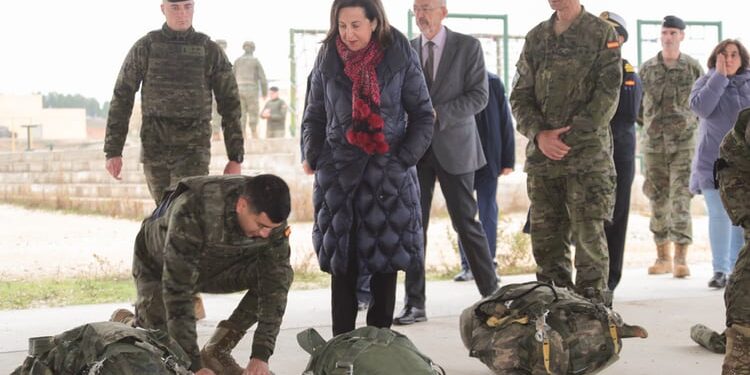Óscar Ruiz / Escudo Digital
The UN peacekeeping mission in Lebanon, UNIFIL, has been renewed in the midst of constant clashes between Hezbollah and Israel, and Spain continues to lead what may be the most complicated international military mission at the moment.
The United Nations Security Council has extended the mandate of the United Nations Interim Force in Lebanon (UNIFIL), and it has done so at one of the most complicated times for the mission because, if it was already a complicated task, Hamas’ terrorist acts in Israel on 7 October 2023 opened the way once again for another war between Lebanon and Israel, which is exactly what this mission is trying to avoid (among other things). On 28 August, the UN adopted Resolution 2749, extending UNIFIL’s almost two-decade-old mission to maintain peace between Israel and Lebanon until 31 August 2025, which, if there is no change next year, will continue to be led by Spanish Major General Aroldo Lázaro Sáenz.
The UN mission aims to implement Resolution 1701 of 2006, which, in addition to stopping the war in 2006 and significantly increasing the number of blue helmets in the area, develops measures to de-escalate the conflict and above all tries to ensure stability along the Blue Line, which refers to the UN-recognised border between Lebanon and Israel. This resolution allows for a maximum of 15,000 troops to be deployed in this area, although there are currently around 10,000 soldiers from 49 participating countries.
Global hotspot
If the UN mission was already controversial and dangerous, the massive launching of rockets, drones and missiles by Hezbollah on 7 October 2023, in solidarity with Hamas’s terrorist acts in Israel, turned the international spotlight on this mission in one of the hottest spots on the planet at the moment.
As in almost all UN missions, the purpose of the Blue Helmets is not to intervene directly with force, but primarily to monitor and report to the UN and to mediate between the Lebanese and Israeli governments (though not with Hezbollah, which after all has control of southern Lebanon). However, the Blue Helmets deployed there do conduct operations against Hezbollah rocket fire, patrolling jointly with Lebanese Army troops looking for potential rocket launching sites. While the mission’s objectives have not changed since 7 October, internal security measures have, as tensions in the region have obviously increased significantly. According to official UN sources, since the attacks, patrols along the Blue Line have been increased, as have measures to evacuate Blue Helmets if necessary. The constant danger of war between Beirut and Tel Aviv is constant, and although the leaders of both countries have confirmed their desire for peace, everything seems to indicate that armed conflict could break out at any moment.
The technical, but especially political, obstacles of this mission make it practically unfeasible, as it lacks the necessary equipment to monitor its area of operations, thus relying on local sources. Moreover, the mission is obliged to coordinate its activities with the Lebanese authorities, who are not very keen on stopping the armed activities of the Hezbollah group.
The renewal of this mission to try to restore peace in the region (or to avoid a new war between Lebanon and Israel) has been a point in favour of the UN, which assumes the risk that this entails, but certainly in this environment of growing tension the mission must be renewed and adjusted to the pre-war situation in which we find ourselves. The security of the blue helmets in the area is directly proportional to the technical and political limitations they face in carrying out their mission, and it is on these two elements that work should be done to guarantee the integrity of the soldiers first, and then the success of the established objective, which is none other than the maintenance of peace in the region.
Spain leads UNIFIL from 2022
Spain, under the leadership of Major General Aroldo Lázaro Sáenz, will remain at the head of the UN mission in Lebanon until 2025, following the renewal of the mandate by the UN Security Council. General Lázaro assumed command in February 2022, at a time of great tension in the region, especially on the border between Lebanon and Israel.
Spain’s participation in UNIFIL has been vital since 2006, following the war between Israel and Hezbollah. It currently has some 650 troops among an international contingent of 10,000 soldiers from 49 countries. The Spanish soldiers are tasked with monitoring the border line, known as the Blue Line, preventing rocket fire and providing humanitarian assistance in the areas most affected by the fighting.
The challenges for Spain in this new mandate are easy to imagine following the escalation of violence driven by Hezbollah in support of Hamas, which has provoked attacks from southern Lebanon towards Israeli positions. And consequently, the possibility of a new and devastating all-out war between Israel and Lebanon.
This situation, together with the tensions in the West Bank, forces Spain to adapt its operations to guarantee the security of its troops and continue with its mission in an increasingly dangerous and volatile context.







